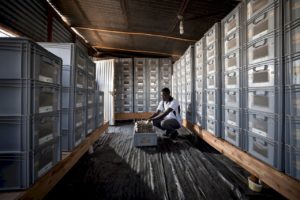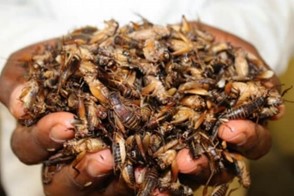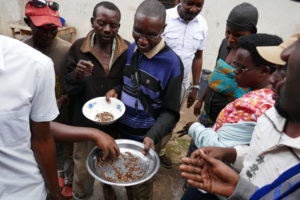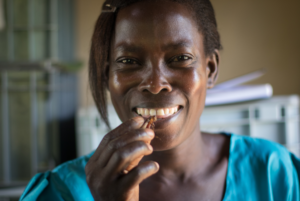Mission
The Flying Food Partnership facilitates the crickets business for human consumption in Africa. By implementing an inclusive value chain on crickets we create access to affordable proteins for all, we create an innovative, profitable line of business that provides local jobs and livelihood and we introduce a climate smart alternative for traditional livestock. Our mission is to make the crickets a mainstream food product by establishing the rearing, processing and consuming of crickets successfully in 10 African countries.
Business opportunity
Insect farming shows great potential for growth and scalability as the market is rapidly increasing for novel protein sources from farmed insects. Estimates show that the market for farmed insects for human food and animal feed in Africa will be worth up to US$8 billion by 2030 (World Bank, 2021). The Flying Food Partnership developed a practical approach with sound business model for setting up the cricket business
Why crickets?
Crickets are tasty, affordable and very nutritious. They taste a bit nutty and have a high protein content (65% of dry weight); twice as much as beef! Crickets contain all 9 essential amino acids and are a rich source of iron and calcium. Crickets are a natural nutrition power house!
Cricket farming is an environmental friendly alternative for conventional cattle, pig or chicken farming. A cow consumes 400 kg of feed, 10.000 liter water and has high emission of green house gasses, where for 1 kg of crickets just 2 kg of feed and few liter of water is required without very limited emissions. Choosing an insect-based lifestyle once per week, can save the earth 650.000 liters of fresh water (Entomofarms, Canada).
Worldwide, 80% of the population is used to eating insects. There are over 1800 species of edible insects, ranging from beetles to bees, from grasshoppers to caterpillars. Insects are often caught from the wild and therefore only seasonally available. Flying Food will make crickets available whole year-round. Crickets form a novel type of protein. In 2021 the EU accepted crickets as novel food. Using insects directly as food applications is much more efficient compared to using them for feed. How to present crickets to end-consumers is dependent on local eating habits and requires thorough market research. But our experience is that cricket powder is most successful as nutritious additive to porridge, bread and cookies.





 Impact
Impact
Insect farming provides tremendous health, social, economic, climatic, environmental, and food security benefits in Africa. Crickets provide better nutrition (contributing to SDG 2), boosts employment and income generation, especially for women and youth in sub-Saharan Africa (contributing to SDG 8 and 5) and reduces the environmental footprint of protein production (SDG 13).
